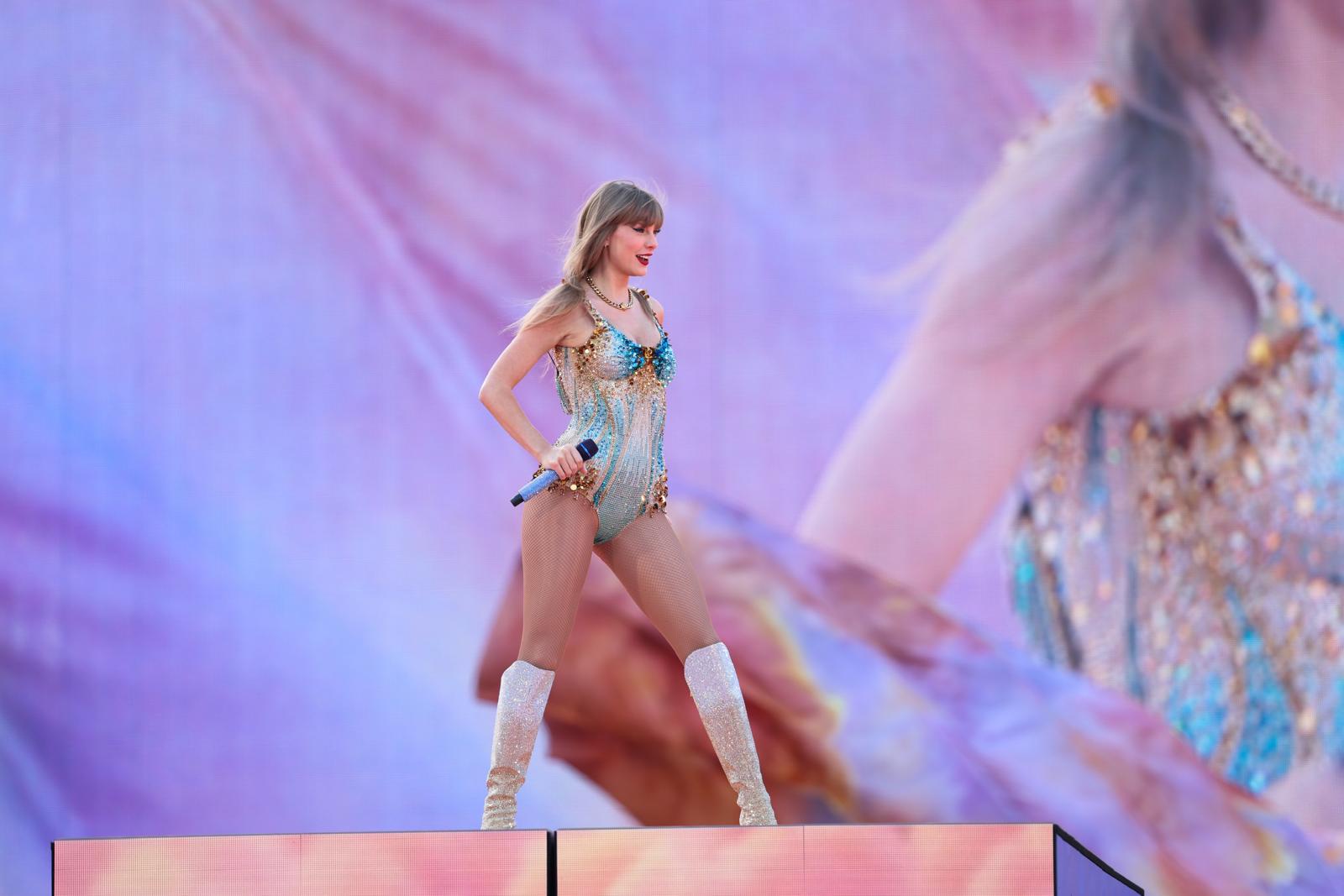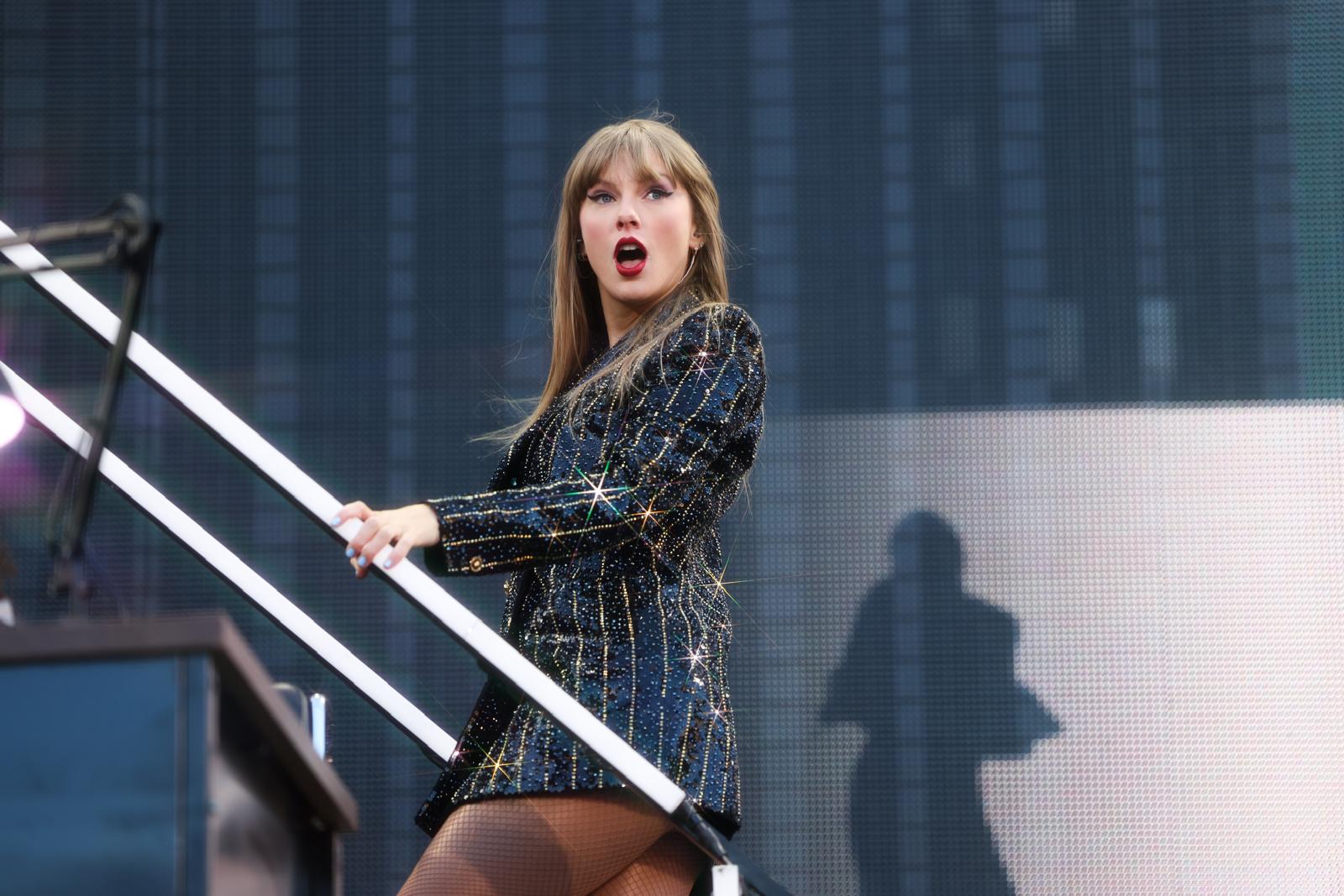Taylor Swift Eras Tour review, Edinburgh: Like mainlining dopamine for three hours straight
Swift pushes past a painful hand cramp to deliver a sprawling, 45-song set that doesn’t miss a beat
As Taylor Swift emerges on stage, stepping out from a billowing shell of pastel sheets like Venus herself – a Botticellian blonde in a bejewelled bodysuit – it dawns on me that I’ve seen this before. I know on what exact beat she’ll turn her head and flip her hair. The world’s most useless soothsayer, I can see precisely 30 seconds into the future of this evening at Murrayfield Stadium in Edinburgh, where Swift performs her hugely anticipated Eras Tour for the first time in the UK.
The show’s mammoth three-hour duration has been sliced, diced and fed to the people, willing or otherwise, in videos, photos, and front-page spreads that have circulated endlessly since it kicked off in Arizona in March 2023. The Eras Tour – immortalised last year on the big screen (the highest-grossing concert film of all time) – has already made a billionaire out of Swift, and an omnipresent one at that. Because although tonight may be the first time I see Eras in person, virtually, it’s the gazillionth time Swift has beckoned me, and the 73,000 others in the crowd, with the fast flick of her wrist to the woozy tones of set opener “Miss Americana and the Heartbreak Prince”.
You’d be wrong to think that familiarity breeds boredom. As the onstage clock strikes midnight (in reality, it is 7.15pm), we all watch, our collective breath held, as though it’s the first time she has ever stepped onto a stage. The excitement reaches fever pitch as Swift charges into the synth pop chords of fan favourite “Cruel Summer” as she surveys her 18-year ascent from Nashville prodigy to culture-dominating pop behemoth.
Setlists with more than 20 songs are typically reserved for legacy acts; Swift performs 45. Some arrive abridged, while others play out in full as she traipses her way through eight albums. Her magnum opus, the 2021 breakup track “All Too Well (10 Minute Version) (Taylor’s Version) (From The Vault)”, is allowed to run in its entirety, as long and luxurious as its title.

It’s been 14 years since her breakup with Jake Gyllenhaal (the actor about whom it was reportedly written), but it might as well have been yesterday. There are few things Swift does as well as telegraphing righteous rage and hurt: her voice snags on the silky simplicity of the song’s arrangement, backed by her 10-piece band known as The Agency. As a song, “All Too Well” is a showcase for the heartbreak that animates her finest songs. As a performance, it’s a testament to how Swift, at her best, can harness big-tent power and small gig intimacy in a single note.
It is one of several songs that will conjure tears on Friday night. Across the evening, I see girls wailing, swooning, hugging. But more than anything, I see girls crying. There are some Beatlemania-style sobs. Not only during the lovelorn ballads, but at seemingly random points, too. Even the coquettish sugar rush of “Love Story” and “Fearless” yield wet, mascara-strewn cheeks.
Away from the internet, where it can quickly grow teeth, the Swiftie fandom is wholesome. Compliments are traded between strangers as freely as homemade friendship bracelets. It’s like Burning Man without the drugs (or the alcohol, apparently; it’s the shortest bar line I’ve ever seen). For all the moaning we do about the death of communal cultural experience, the camaraderie on show tonight is a balm. We can still enjoy things together, Swifties prove.

Staging-wise, it is a spectacle. If this was a film, it would be a Spielberg production. The effects, albeit big, are considered. Pyrotechnics are reserved for the venomous bite of “Bad Blood” and confetti doesn’t burst out of cannons, but is released in soft showers. Despite myself, I’m still bewitched when Swift appears to swan dives into a glistening pond of pixels.
That said, one can’t help but imagine this taking place in a closed stadium: how the lilac lights of “Lavender Haze” or the enchanted everglade of “Cardigan” might pop if they were set under a canopy of darkness. But the moon doesn’t fall under Swift’s jurisdiction – despite what the vastness of her influence might suggest.
There is a gilded veneer to Swift that is tough to penetrate, but the crowd has a good go at it, showering the musician with three minutes straight of deafening adulation at the end of “Champagne Problems”. A crack shines through, too, when part way through strumming “Would’ve, Could’ve, Should’ve”, her hand cramps and she has to stop. “It’s forming a claw,” she laughs. “Does anyone relate?” Everyone roars in agreement. It’s her first time playing in Scotland for nearly 10 years, and it is a toasty welcome.
Some eras translate better than others. Her companion albums, folklore and evermore, are muted affairs with fingerpicked ballads and fluttery ditties that get lost between the libidinous thrust of Reputation and the Eighties bubblegum pop of 1989. The ghostly remove of Swift’s vocals on “august”, for example, is swallowed by the stadium’s acoustics.

The penultimate portion of the evening, a six-song selection from her latest release The Tortured Poets Department, fares surprisingly well. Not least because the crowd appear to know the new lyrics as comprehensively as the old stuff (on the train, I spy a pair of teens diligently studying the words to “But Daddy I Love Him” on a cracked iPhone). The country-tinged track, fiddle and all, recalls Swift’s roots. She’s brilliant as she channels brattish, youthful defiance.
The way Swift dances on tour has become a talking point among fans and critics. When she sings of money, she rubs invisible notes between her fingers; when she complains of a lover’s tardiness, she points to an imaginary watch on her wrist. It’s a style that recalls countless adolescent afternoons spent choreographing dances with friends. “Edinburgh, are you ready to go back to school with me?” she asks the crowd.
Nostalgia is a powerful thing and tonight, Swift uncorks bottles and bottles of it, spraying it like champagne on an obliging, adoring audience. It’s like mainlining dopamine for three hours straight.
Join our commenting forum
Join thought-provoking conversations, follow other Independent readers and see their replies
Comments
Bookmark popover
Removed from bookmarks